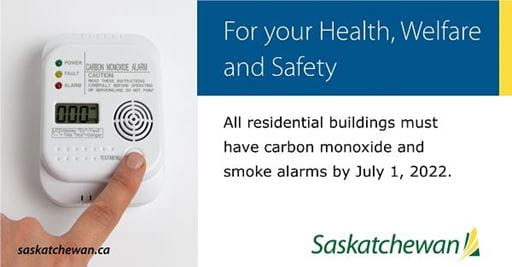Released on September 3, 2021
All Saskatchewan residential buildings will require working carbon monoxide and smoke alarms by July 1, 2022
Today, Government Relations Minister Don McMorris announced amendments to The Uniform Building and Accessibility Standards Regulations (the UBAS Regulations). The amendments require carbon monoxide (CO) and smoke alarms be installed in all residential buildings in Saskatchewan, regardless of the building's age. Prior to this amendment, smoke alarms and carbon monoxide alarms were only required in new residential construction that were built since 1988 and 2009 respectively.
"The health, welfare and safety of residents in their homes is a priority in building safe communities and a strong Saskatchewan," McMorris said. "Requiring all residential buildings to have working CO and smoke alarms ensures you and your family are better protected against these dangerous substances."

Carbon monoxide is an invisible, odourless, poisonous gas that is often produced when fuel-burning appliances like furnaces, stoves, water heaters and fireplaces malfunction. Carbon monoxide incidents happen frequently; between 2018 and 2020, an average of 1,200 CO incidents were reported annually to SaskEnergy. If there isn't a working CO alarm to alert you to its presence in your home, continued CO exposure can lead to confusion, drowsiness, loss of consciousness, brain damage and death.
Smoke from residential fires spread quickly. Since residential fires can become life-threatening in less than two minutes, a working smoke alarm can alert you and your family to escape before a fire spreads. In their 2020-21 annual report, the Saskatchewan Public Safety Agency noted that of all fires reported to the agency during that period, 36 per cent (440 fires) impacted residential structures.
"Saskatchewan citizens want assurance that their residences are safe, and it has been shown that working carbon monoxide and smoke alarm devices save lives," Saskatchewan's Chief Building Official Marvin Meickel said. "When implemented, the regulations will establish a minimum level of life safety for people, now and into the future."
To allow property owners enough time to purchase and install these alarms, compliance with this new requirement will not be enforced until July 1, 2022. For more information about this UBAS Regulation amendment, the approved alarm models or where you should install these alarms in your home, please visit Carbon Monoxide Alarms and Smoke Alarms.
-30-
For more information, contact:
Kathy Goldfinch
Government Relations
Regina
Phone: 306-787-2687
Email: kathy.goldfinch@gov.sk.ca

